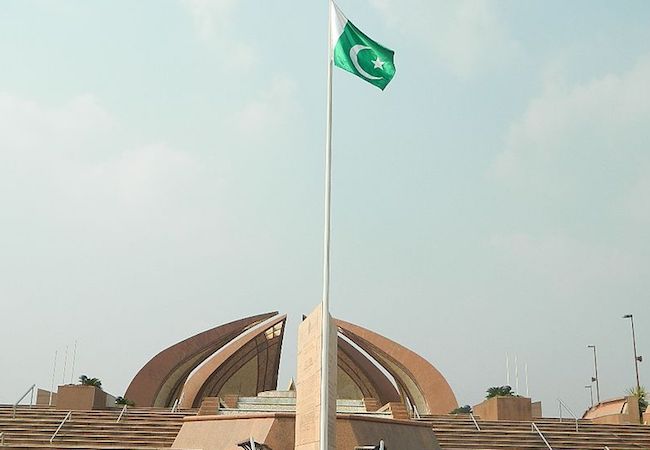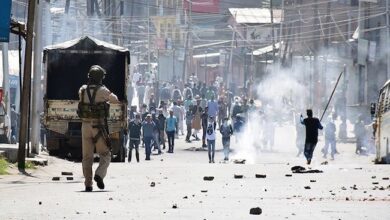
By Saeed Wazir
The recent polarized, tightly held by-election in NA-120 has evinced much hue and cry in the commercially competitive, divided media and across the intellectual and academic landscape. In the midst of political circus at home and shifting global geo-strategic and political realignment, the much-touted narrative of mainstreaming and up-streaming deadly militant outfits brought to the fore a new dimension in the counter-terrorism discourse.The Labbaik Ya Rasulallah and the Milli Muslim League secured 11 per cent of the overall vote.The former eulogizes the condemned, executed murder, Mamtaz Qadri, while the latter hails Osama bin Laden as a hero and harbors regional jihadist and sectarian orientations. This bodes ill for the nascent democratic project.
The proponents of mainstreaming cite the reintegration of a former militant Afghan warlord Gulbadin Hekmatyar and Northern Ireland’s IRA/Sinn Fein duo. They fail to take stock of the glaring dissimilarities in their terror infrastructure, ideological base and operational outreach. Integration of warlords was materialized given the fact that they either challenged the writ of the state or side with religious-political elements which are hell-bent on foiling the system. The Irish movement was based on demanding the right to self-determination which resulted in the total disarmament of the insurgency and its leader’s mainstreaming into the political process. In the case of Pakistan, these militant entities are at war with Pakistan and the region at large. They try to dismantle the very system and impose their self-styled Sharia by force.
A million dollar questions are: whether they should be mainstreamed or disarmed? Do they abide by the constitution and consider parliamentary democracy legal and constitutional? Do they shun violence, jihad and sectarian underpinnings for the larger interests of the state? Is the process is an outcome of collective strategy or an engineered game plan aimed at weakening political parties or orchestrating regional proxies? Will it not complicate Pakistan’s militant problem or further tarnish Pakistan’s terror-scarred image in the comity of nations? Or has the state changed its deeply-flawed strategic approach of using proxies and is, of late, ready to resort to geo-economic realities?
In the absence of well-defined, precise and democratic terms of engagement, this unhealthy, misguided move could culminate in destroying the rule of law, the constitution and democracy. In the long run, it may not only further entrench militant Islamism in Pakistan, but further deepen the country’s counterterrorism challenges internally and will interfere in the realm of relations with regional countries.
The un-debated, so-called mainstreaming mantra had better shun for the time being. It’s time the state initiated multidimensional reforms, holistic strategies and calibrated solutions in a bid to resuscitate the crumbling and unnecessarily compartmentalized security apparatus.
To begin with, NACT’s new CVE (counter violent extremism)model needs to cover national security, building community resilience, media engagement, promotion of culture, education reforms, and [creation of an enabling environment for] rehabilitation and reintegration of militants. As logic dictates, the Nacta, federal, provincial governments and civil society should work collectively to reinvent ‘a fresh public discourse for Pakistan’. This will require coming up with intellectual responses to a mélange of critical ideologies; education reforms and cultural revivals; and rehabilitation and reintegration of extremists. This should debunk militant discourse based on violent jihad, sectarianism and quest for the so-called caliphate.
Ironically, education in Pakistan warrants little attention of the high echelons which are oblivious to the lower strata of society. The trajectory of obnoxious radicalization, metastasizing terrorism, economic collapse and political mayhem are the direct outcomes of decades long state’s tinkering with curricula for religious, political and geo-strategic orientations.
The current curriculum promotes xenophobia, racial profiling, ethnocentrism and misplaced, sanctioned notions of forced homogeneity and patriotism. War, conspiracy, caliphate, treachery, victimization pervade through all levels which stunt imagination, lateral thinking and dispassionate overview of temporal and spiritual configuration. This makes the impressionable mind proven to religious predators, political demagogues and state proxies in the name of national interests and corporate motives.
There should be paradigm shift in education policy making circles. It’s a defining moment to celebrate unity in diversity and shun the notion of centralized, forced homogeneity based on religion. We must concede to the fact that Pakistan is and shall remain a multi-religious, multi-cultural, multi-lingual and multi-ethnic state. Historical falsification, inaccuracies and manipulations had better purged of from textbooks. Children should be taught love, compassion, tolerance, possibility and diversity. Integrating both science and arts through a cross-curricular approach is the needy of an hour, which will provide skills and knowledge to compete in a rapidly changing world.
Rather than promoting political socialization, almost all political parties function with militant wings for suppressing dissent within and pursuing ulterior motives in the wake of elections and victimization. The mainstream parties must transfer their highly personalized style of politics at the grassroots level by establishing local headquarters and devolving to and involving common man in decisions-making. This will deny a much-needed space to the resurgent militant outfits. Out of 180 million, 60 percent of Pakistan’s population comprises of youth. They should devise youth friendly national policies in their manifestoes.
Madrassah reforms, especially its curricula, and checks on those mosques and seminaries which harbor affiliations with terrorists must be prioritized on a war footing. Registration and regulation, monitoring foreign funding and foreign students and modernizing curriculum must be materialized.
Reforming and strengthening the criminal justice system, de-politicization and capacity-building of police and para-military forces and total deweaponisations of society should be the main areas of policy making. According to Gun Policy Organization, an estimated 18 million guns are owned privately in Pakistan.
Radicalization of the youth warrants little attention of the corridors of power. Unfortunately, due to the absence of a national youth policy, this younger generation is marginalized, disorganized, and considered unimportant for state institutions. De-radicalization remains a missing link in countering extremism. It is assigned to isolated cabinet divisions, departments or teams rather than streamlining it as a national policy based on intellectual out from the mainstream parties. Again, the three overlapping components of radicalization; the effective, pragmatic and ideological contours are dealt with haphazardly without clear-cut dichotomy.
Pragmatically, a holistic, diagnostic venture is required to delve deep into the push-and-pull factors leading to endemic radicalization and its antecedents. The first stems from flawed and stratified education system, economic disparity, and chronic lack of meritocracy in the job markets, while the later emanates from misuse of religion both for domestic and external compulsions by the civilian and military set-up. Other factors include regional conflicts, socio-political marginalization, and perceived injustice for a person’s community.
Countering hate speech, suppressing banned groups, rampant online militant presence, choking terror financing and transmutation of proscribed outfits with new brands are the grey areas which are exploited by these terrorist networks.
Pakistan needs to reimagine its social, political and security profile in accordance with the needs of the 21st century.Trade, peace and diplomacy must be given top most priority.
Saeed Ullah Khan Wazir specializes in English literature and linguistics at NUML. He is a freelance writer and aspirant to CSS.




